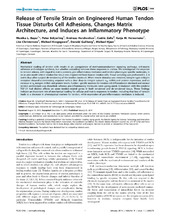| dc.contributor.author | Bayer, Monika Lucia | en_US |
| dc.contributor.author | Schjerling, Peter | en_US |
| dc.contributor.author | Herchenhan, Andreas | en_US |
| dc.contributor.author | Zeltz, Cedric | en_US |
| dc.contributor.author | Heinemeier, Katja Maria | en_US |
| dc.contributor.author | Christensen, Lise | en_US |
| dc.contributor.author | Krogsgaard, Michael | en_US |
| dc.contributor.author | Gullberg, Donald | en_US |
| dc.contributor.author | Kjær, Michael | en_US |
| dc.date.accessioned | 2015-03-30T14:19:51Z | |
| dc.date.available | 2015-03-30T14:19:51Z | |
| dc.date.issued | 2014-01-21 | eng |
| dc.identifier.issn | 1932-6203 | |
| dc.identifier.uri | https://hdl.handle.net/1956/9702 | |
| dc.description.abstract | Mechanical loading of tendon cells results in an upregulation of mechanotransduction signaling pathways, cell-matrix adhesion and collagen synthesis, but whether unloading removes these responses is unclear. We investigated the response to tension release, with regard to matrix proteins, pro-inflammatory mediators and tendon phenotypic specific molecules, in an in vitro model where tendon-like tissue was engineered from human tendon cells. Tissue sampling was performed 1, 2, 4 and 6 days after surgical de-tensioning of the tendon construct. When tensile stimulus was removed, integrin type collagen receptors showed a contrasting response with a clear drop in integrin subunit α11 mRNA and protein expression, and an increase in α2 integrin mRNA and protein levels. Further, specific markers for tendon cell differentiation declined and normal tendon architecture was disturbed, whereas pro-inflammatory molecules were upregulated. Stimulation with the cytokine TGF-β1 had distinct effects on some tendon-related genes in both tensioned and de-tensioned tissue. These findings indicate an important role of mechanical loading for cellular and matrix responses in tendon, including that loss of tension leads to a decrease in phenotypical markers for tendon, while expression of pro-inflammatory mediators is induced. | en_US |
| dc.language.iso | eng | eng |
| dc.publisher | PLoS | eng |
| dc.rights | Attribution CC BY | eng |
| dc.rights.uri | http://creativecommons.org/licenses/by/4.0 | eng |
| dc.title | Release of tensile strain on engineered human tendon tissue disturbs cell adhesions, changes matrix architecture, and induces an inflammatory phenotype | en_US |
| dc.type | Peer reviewed | |
| dc.type | Journal article | |
| dc.date.updated | 2015-03-03T16:06:14Z | en_US |
| dc.description.version | publishedVersion | en_US |
| dc.rights.holder | Copyright 2014 Bayer et al | |
| dc.source.articlenumber | e86078 | |
| dc.identifier.doi | https://doi.org/10.1371/journal.pone.0086078 | |
| dc.identifier.cristin | 1128170 | |
| dc.source.journal | PLoS ONE | |
| dc.source.40 | 9 | |
| dc.source.14 | 1 | |
| dc.subject.nsi | VDP::Medical sciences: 700::Basic medical, dental and veterinary sciences: 710::Medical genetics: 714 | eng |
| dc.subject.nsi | VDP::Medisinske fag: 700::Basale medisinske, odontologiske og veterinærmedisinske fag: 710::Medisinsk genetikk: 714 | nob |

